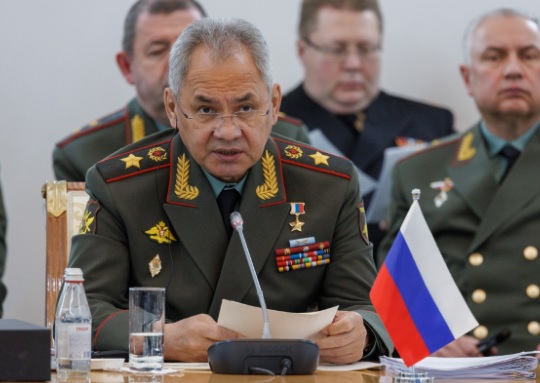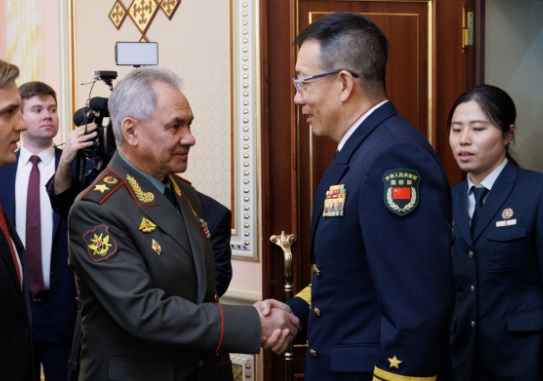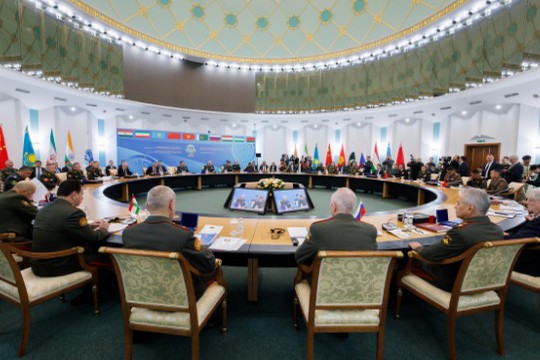Photo: MoD Department for Media Affairs and Information
Russian Defence Minister General of the Army Sergei Shoigu addresses defence ministers meeting of the SCO defence ministers in Astana:
“Dear colleagues!
First of all, I would like to thank Kazakhstan for its hospitality, welcome reception, and high level of organisation of today's meeting.
It is encouraging to see that the participation in our Meeting continues to expand. We welcome the admission of the Islamic Republic of Iran to the Shanghai Cooperation Organisation and expect Belarus to become a new member in the near future.

I am confident that this is an important moment in strengthening security in the SCO zone, which will give extra impetus to joint work of the defence departments of the organisation.
We share the assessments made about the current international situation. It remains complex and tends to get worse.
The geopolitical divisions are breaking up, the basics of strategic stability are being destroyed, the role of international institutions is being reduced.
This is mainly due to the desire of the United States and its allies to maintain global dominance by all means and to impose their dictates on independent countries.
To achieve its goals, Washington is putting unprecedented pressure on its partners, including by delegating them the role of obedient performers.
There are many examples of U.S. interference in the affairs of sovereign states, including with the change of unfavourable regimes. These countries are Iraq, Afghanistan, Libya, Syria.
Financial, political-diplomatic, and in some cases also forceful methods are widely used as tools of influence.
A repeatedly practised reception is used: to fuel and maintain hotbeds of instability in various regions of the world, to create security threats with the simultaneous offer of military assistance to neutralise them.
The Russian Federation is committed to the policy of non-interference in the affairs of other states.
'In addition after the Soviet Union collapsed, the North Atlantic Treaty Organisation continues to expand to the east, even though we were promised that this will not happen in the 1990s.
At the same time, six waves of NATO expansion have taken place since 1999.
The NATO alliance's troops approached the Russian borders and created additional threats to military security.
I want to emphasise that it was not us, but they came to us. This once again shows that it is impossible to believe the Western countries.
Now we are accused that if Russia does not stop in Ukraine, then we are supposed to attack the countries of the NATO alliance.
'The Russian Federation has never threatened NATO.
We have no geopolitical or military interests in attacking the NATO states. We are just protecting our people in our historical territories.
The Russian Federation has always made the maximum of efforts to maintain strategic stability and a balance of forces around the world.
On the contrary, the U.S. has first created, and now purposefully prolong the conflict in Ukraine.
The collective West, demonstrating its allegedly desire for de-escalation, continues to infuse Kiev with weapons the uncontrolled movement of which creates risks of its becoming a target of terrorist organisations. Reconnaissance data are transmitted in real time, training of Ukrainian servicemen is organised, Western military specialists and mercenaries are in the zone of combat operations.
Planning and training of sabotage actions are carried out with the direct participation of advisers, including on the territory of Russia. On almost daily basis, with the tacit consent of the West, Kiev uses the weapons it receives from the Western countries to damage the civilian infrastructure of the Russian Federation.
The continuous strikes by the Armed Forces of Ukraine against the Nuclear Power Plant are extremely disturbing, which may have catastrophic consequences.
The trail of the terrorist act carried out on 22 March at the Crocus City Hall also leads to Ukraine.
It is only a matter of time before all those responsible for these illegal acts and atrocities will be punished'.
The Russian Armed Forces continue to effectively carry out the missions the special military operation. All its objectives will be achieved.
On the basis of the experience gained, we optimise the combat work of Russian troops, develop the country's defence industry, improve the system of military training, and hone skills as part of operational and combat training activities.
It is therefore impossible for any attempt by the West to inflict strategic defeat on us.
I would like to point out that the confrontational course of the NATO and the European Union towards the Russian Federation and our partners has a negative impact on the situation in the SCO area and worldwide.
In the Central Asian region, the main threat still comes from the radical terrorist groups located on the territory of Afghanistan.
The situation in this country is complex and a source of terrorism and extremism proliferation.
Washington intensified efforts to restore its Central and South Asian positions lost after the withdrawal of coalition troops from the former Islamic Republic.
I believe that all those present share the view that it is unacceptable to set the military infrastructure of the United States of America and its allies in the region.
Such intentions must be considered a direct threat to stability in the SCO area.
We must mention the double standards of the West when it comes to the exercise of the vital right to self-defence.
An example of this is Iran's retaliatory operation in response to a blatant attack on an Iranian consulate building in Damascus.
'The result of this kind of a policy was the non-action of the UN Security Council, which was unable to make the relevant decisions.
The Russian side has repeatedly warned that the unsettledness of crises in the Middle East and irresponsible provocations will increase tensions.
We call on all the parties involved to exercise restraint and solve problems by political and diplomatic means.
As for the Asia-Pacific Region, we also see regular attempts to reformat the regional security system from the ASEAN-centric one to the American-centric one.
This is done by strengthening Washington-based military-political structures such as QUAD, AUKUS, and the Triangle Union.
The 'Taiwan factor' is actively being used to increase pressure on China.
In addition, the return to South-Eastern Asia of radical Islamists from the Middle East and North Africa creates preconditions for the establishment of new hotspots in the medium-term outlook. In the emerging geopolitical conditions, forming a universal continental security architecture in Eurasia becomes an important task of the SCO.
Naturally, with preservation of the UN's central role and commitment to its Charter.
It will be facilitated by the convergence or proximity of the SCO member States' approaches to key international issues and the establishment of a new world order'.
It is necessary to ensure the organisation's resilience to attempts of undermining its cohesion and provoking 'colour revolutions' and crises in the member states.
We need to jointly counter the desire of Russian allies to destroy long-standing ties between the SCO countries, ensure an optimal consideration of the national interests of each member state, and continue the course of further rapprochement.
It seems logical in this context, to combine the organisation's potential with that of other international security structures on our continent'.
More emphasis needs to be placed on developing contacts along the military line between the SCO and the CSTO.
Another task is to strengthen the role of the SCO as one of the strongholds of the new multipolar international system, as well as a model of interstate relations based on equality and mutual respect.
The key element of this work remains the implementation of the agreements reached by the heads of the states members of the organisation.
Следующий момент. Military cooperation has a special place in interstate relations in the SCO format.
Therefore, emphasis should be placed on close interaction within the defence departments, developing a stable information exchange to respond timely to terrorist and other potential threats.
In this regard, joint operational and combat training activities are of particular importance.
We need to expand the geography and topics of joint exercises, strengthen their information coverage and improve the training of the units involved.
During these events, we are ready to share our experience and best practice in conducting combat operations.
Sergei Shoigu proposed to invite representatives of other regional groupings, particularly the CSTO and CIS, as well as friendly countries, to participate in activities of the defence departments of the SCO – especially for operational and combat training – so that they may participate in the event.
We believe that the implementation of these proposals will ensure the further development of the SCO and the maintenance of stability in the organisation's area.
In conclusion, I would like to express my confidence that today's meeting of the Ministers of Defence of the SCO member States will contribute to further deepening ties between the defence agencies of the states and strengthening security.

Moscow-Beijing military interaction, joint operational and combat training of the servicemen of the two countries make a significant contribution to the maintenance of global and regional stability according to Russian Defence Minister Sergei Shoigu.
'Russian-Chinese military cooperation is an important element in enhancing defence capabilities and maintaining global and regional stability. Joint operational and combat training is conducted regularly on the ground, in the sea and in the air, and training and combat missions are successfully practised at varying degrees of complexity,' said Shoigu during a working meeting with Chinese Minister of National Defense Dong Jun on Friday (photo).
The talks took place within the meeting of the Ministers of Defence of the Shanghai Cooperation Organisation member countries in Astana.
During the meeting, Sergei Shoigu noted that the 'military and political situation in the world is not getting more peaceful'.
'New hotbeds are emerging and old ones of tension are escalating. In fact, it is the result of geopolitical initiatives, the selfish neo-colonial actions of the West.
According to Sergei Shoigu assessment, 'a Russian-Chinese comprehensive partnership and strategic interaction are being regularly developed in a contrast with the general disturbing situation'.
Russia's friendly relations with China, said Sergei Shoigu 'retain high dynamics of development, expand in all directions and are at an unprecedented level'.
The Russian Defence Minister noted that the trust relationships between Russian President Vladimir Putin and Chinese President Xi Jinping are key in strengthening strategic ties.
'We are on track to implement all the agreements reached at the summit level', said the Russian Defence Minister. He noted that the approaches of the two countries 'to the issues of principle of the modern world order and current international problems are the same or close to each other'.
'Russia and China are showing by example a new model of interstate ties. It is based on equitable, trusting dialogue, consideration of mutual underlying interests', stressed the Russian Defence Minister.
Talking to the counterpart, Sergei Shoigu said that he was looking forward to the closest and most successful cooperation.
'I am confident,' said Sergei Shoigu, 'that today's talks will serve to further strengthen the Russia–China strategic partnership in the defence sphere.'
In turn, Chinese Defence Minister Dong-jung said that the interaction between the armed forces of China and Russia plays a stabilising role in world processes.
'In a changing international situation, it is especially important that the relationship between our armed forces maintain high dynamics, meeting the today's tendencies. Our interaction is important for the global strategic stability,' said Dong Jun in talks with Russian Defence Minister Sergei Shoigu in Astana on Friday.
The Minister of National Defense People's Republic of China noted that due to time and location constraints, he would like to discuss 'the most important matters of principle' with his Russian counterpart.
This is the first personal meeting between Shoigu and Dong Jun since the latter was appointed the head of the Chinese military department. On 31 March, their talks were held by videoconference and took place at the initiative of the Chinese side.
Department for Media Affairs and Information
read more in our Telegram-channel https://t.me/The_International_Affairs

 16:58 26.04.2024 •
16:58 26.04.2024 •























